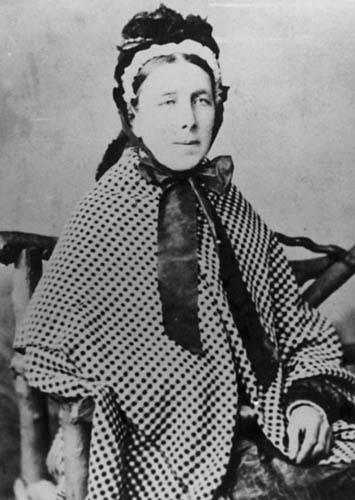
Credited to the Collection of Toitū Otago Settlers Museum
Permission of Toitū Otago Settlers Museum must be obtained before any re-use of this image
Learmonth White Dalrymple
c.1827–26 August 1906
Educationalist who campaigned for girls’ secondary education
Learmonth White Dalrymple was a New Zealand educationalist who campaigned for girls' secondary education in Dunedin and for women to be admitted to the University of Otago.
She was born in Coupar Angus, Angus, Scotland about 1827, the eldest of nine children. Her father William Dalrymple, was an ironmonger and trader in minerals, manure and grain. Her mother Janet (née Taylor) died on 23 February 1840. Learmonth went to school at Madras Collegein St Andrews but also took over much of the work of raising her siblings.
William decided to emigrate to New Zealand with Learmonth and four other of his children. They settled in Kaihiku, south-west of Dunedin, where Learmonth ran the household while establishing a Sunday school.
In August 1863 the Otago Boys' High School opened. To mark the occasion, The Otago Daily Times published an editorial calling for an equivalent girls' school. Dalrymple read this and wrote in support of the idea starting a petition. The motion passed unanimously, but nothing resulted from it. Learmonth later presented the petition to the Provincial Council in early December 1865. It was passed to a Select Committee on Education, which praised it and recommended it be implemented, but again no action was taken.
Dalrymple formed a Ladies' Committee of the High School for Girls, wrote numerous letters over the next two years and held public and private meetings to keep the issue in front of the Provincial Council and the public. She moved to Port Chalmers, which gave her greater access to the city. Dalrymple wrote to Superintendent James Macandrew's wife and persuaded her to allow a meeting with her husband. This was so successful that Macandrew requested the Education Board to create a proposal, and from that proposal created an Education Commission "to determine the best site and scheme for a High School and to consider whether it is expedient that provision should be made in the same building for the teaching of girls as well as boys".
The Ladies' Committee called a new public meeting and prepared a new petition. The meeting recommended that a girls' high school be established, similar to the existing boys' school, and put forward principles of operation for it. Dalrymple forwarded the recommendation to the Education Commission. The proposal was warmly received and in 1870 the Provincial Council and Education Board made arrangements for the opening of the new school, and the Otago Provincial School for Girls opened on 6 February 1871 - the first public girls' high school in the Southern hemisphere.
The University of Otago opened in July 1871. On 31 July Dalrymple and her committee circulated a petition calling for women to be admitted to the university, saying that a degree would be a certificate to encourage study and raise teaching standards amongst women. The petition was presented to the university council on 8 August, and they unanimously resolved that women should be admitted, but that they would compete for certificates, the equivalent of degrees. This was the first university in Australasia to accept women students.
Dalrymple worked to improve kindergarten education, writing a pamphlet and requesting to Parliament that they establish the Frobel system of pre-school learning.
She moved to Feilding in 1881 with her father. There she was active in the Women's Christian Temperance Movement and women's suffrage movement. She returned to Dunedin about 1901 as her health failed, and died there on 26 August 1906.
To make your own nomination download the nomination form here